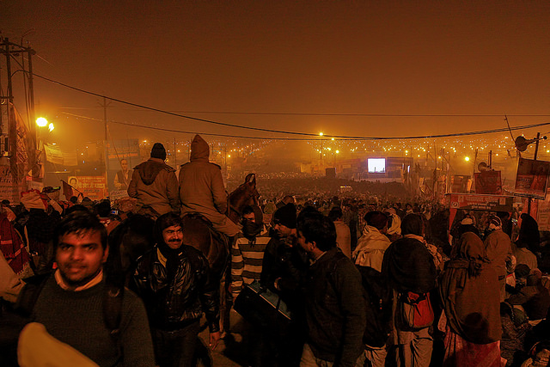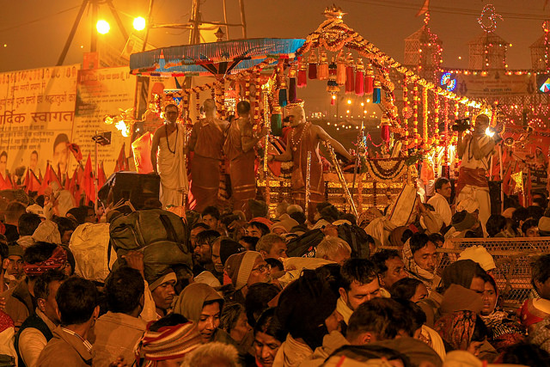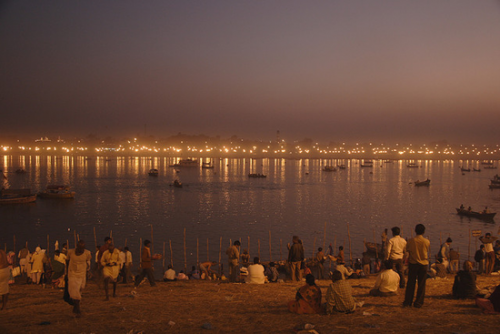Chances are you have never heard of the Kumbh Mela. Any coverage of the event on Western television is usually given short shrift, the name translated with a shrug as “The Festival of the Pot.” A crowd shot, and some mention of how many people attended, given in millions. Indians themselves record the numbers in lakh or chror—for in a country of over a billion people isn’t it more useful to count in multiples of a hundred thousand or ten million? On the television screen you might see ten seconds of local color: hoards of Naga Babas, warrior ascetics with streaming dreadlocks, storming into the waters clad only in marigolds and ashes. And you think, “How exotic!” but you can have no notion of the event itself.
The Kumbh Mela is a vast pilgrimage, a Hindu revival meeting, a gathering by the confluence of three holy rivers, a celebration of faith. Yet it is also a chance for living human beings to participate in recreating an ancient cosmic event, nothing less than the renewal of cosmic rectitude through the joined efforts of the ancient demons and gods of India, good and evil, when they came together to churn the Ocean of Milk.
I had traveled twice before to India, first as a tourist, later as a seeker, but I wanted to go deeper. So when my friends and I were invited to the Maha Kumbh Mela, the largest gathering of humanity in history, invited to stay in the ashram of a local guru with a talent for needling the authorities, in a building that had been partially demolished when these same officials, it was rumored, caused a wrecking ball to be swung against it “accidentally” three times, we agreed to travel together to Allahabad, a city in north-central India. Our contributions would help shore up the ashram’s crumbling facade, and we would bed down on straw pallets, on a rise overlooking the floodplain where three rivers come together to form the auspicious bathing place called the Sangam. In winter the rivers retreat to their broad dry-season shallows, and the sprawling rainy-season floodplain turns into a landscape of fine silt, where every twelve years a city is built, complete with roads and privies, electricity and housing, markets and banks, to accommodate the millions who come, when the stars are right, to take the holy “dip.”
* * *
I wasn’t thinking particularly profound thoughts about a pilgrimage when I decided to come on this journey. I loved India, its smells and hues and complexity, and had not been back for many years. And it would be fun to travel with my friends, one of whom had never been out of the United States. But once you make a commitment to take a pilgrimage, a pilgrimage has a way of taking you. And so it happened that on a December night, about a week before we were scheduled to fly to India, I found myself in the emergency room of Mount Desert Island Hospital, my heart beating out a peculiar syncopation that took several electric shocks to set it pumping smoothly again.
My doctor is explaining the procedure to me, and I am telling him with a casualness that surprises us both, “Just get on with it,” because I’m leaving for India in a week to bathe in the Ganges with millions of pilgrims. My physician, a sober Canadian who looks like a very young John Denver, shoots me a look that tells me he is not entirely sure whether to cardiovert me or have me fitted for a straitjacket. I finally agree to postpone my trip, but only by a week, and only until he can get me on some meds that will, I hope, prevent this arrhythmia from recurring when I am far away from familiar Western medical care. But what is really happening inside me is the realization that, unlike the millions of Indians who are traveling to the Kumbh Mela by train and bus and on foot across the subcontinent, as a Westerner I am insulated from that kind of pilgrimage. If I were walking across India and got a blister, there would always be a credit card and a night in a comfortable hotel. So the question arises: Of what does my own pilgrimage consist? Is it not this moment of sitting on gurney in an emergency room, wired to an electrocardiogram, with the eavesdropping universe asking, “Okay, kid, how badly do you want this? Do you long to go with your whole heart?” And in this same moment comes a resounding YES! and I understand on what feels like the deepest possible level that whatever happens in India, whether I live or die, I will be, I am, perfectly all right.
As an Indian friend later tells me, all pilgrimages are internal.

The legend of “Churning the Ocean of Milk” is told in many of the Hindu scriptures. Stone carvings adorning temples from India to Angkor Wat show how the gods and demons wrapped the giant snake Vasuki around a holy mountain, and how, pulling back and forth, with the gods arrayed on one side and the demons on the other, they spun the mountain like a butter churn until the primordial ocean offered up its treasures. The greatest of these was the Kumbh—not a pot, really, but a vessel, brimming with Amrit, the Nectar of Immortality.
The story begins in a time of spiritual malaise, when the gods and demons had been locked in war for eons, a time when neither were yet immortal. The war took an awful toll, and finally the gods went to Lord Vishnu for advice. He told them to churn the Ocean of Milk for the Amrit, which not only would make them immortal but also would reestablish righteousness and set all creation on a better path.
But there was a hitch. The gods, weakened by war, could not do it alone; they needed to enlist the help of the demons. But under no circumstances could the demons be allowed to partake of the Amrit, lest they too become immortal.
The gods strained and the demons cursed. After much effort the vessel emerged from the deep. In the ensuing scuffle the demons grabbed the pot. The gods were frantic, but Lord Vishnu tricked the greedy demons and escaped with the Kumbh, flying all over the universe and hiding the Amrit at various holy places. In his haste Lord Vishnu spilled a few drops here and there, including at Allahabad, at the place where the three rivers meet: the muddy Ganges, the blue Yamuna, and the mystical underground Saraswati, river of faith and deep knowing. And every twelve years, when the stars are right, millions of people make a pilgrimage to this very spot to bathe in the meeting rivers, which, they believe, briefly flow with the Amrit of Immortality.
* * *
In my journey to the Maha Kumbh Mela I traveled with Matthew and Laurence, two old friends from Bar Harbor. Matthew and I traveled light, but this was Laurence’s first trip overseas and he had packed for all contingencies. Bunion pads and bungee cords, duct tape, combination locks, journals, tarps, cameras, Luna Bars, dried fruit, four hundred rubber bands, and an elaborate water purification system. I tried to explain that there was bottled water in all but the remotest villages in India, but he wouldn’t hear it. He had alfalfa seeds, and jars for sprouting them—Laurence had spent years as a raw-food vegetarian—shoes for any situation, sweaters, pants long and short and in between, pliers, push pins, a pink mosquito net, red suspenders, and a hammer and nails. A can of nuclear bug spray promised to purge every crawling, stinging thing from our bedrooms. Beardless, he’d brought a beard trimmer, and Band-Aids, granola, toothpicks, and cotton swabs for cleansing his ears and nasal passages. Toilet paper, Kleenex, grapefruit seed oil, and a huge brick of Callebaut chocolate, which he surreptitiously nibbled to console himself on bad days. He had pills for malaria and Delhi belly, and herbal tinctures and tiny vials of homeopathic remedies to take in case the other pills failed, 180 pairs of Groucho Marx eyeglasses, a sack of molded rubber finger puppets incarnating the Hindu deities Brahma, Ganesha and Kali, two dozen blow-up globe beach balls and a staple gun. Finally, in a small plain box, tied with string and hidden among his socks and underwear, was a Ziploc bag containing a portion of the ashes of his daughter, Kira, who had died at twenty-one, ashes that he hoped to scatter in the Ganges if the spirit moved him.

Everything he carried was shoehorned into an immense duffel bag, which often forced us to hire a second taxi. On those occasions we were not kind to Laurence. As experienced travelers, Matthew and I prided ourselves on living off the land. Yet more than once we found ourselves sheepishly begging some strategic item from Laurence, to his immense satisfaction. Not once did he offer us any chocolate.
The place of the meeting rivers in Allahabad spread out before us, glittering in the morning sunlight. Looking closely we could see the actual spot where the muddy yellow shallows of the Ganges meet the blue depths of the Yamuna. The waters of the Saraswati we could not see, but we felt her, coursing beneath everything. At any hour, the Sangam was marked by a line of little rowboats, hired to carry pilgrims to bathe in the exact spot where the rivers meet.
At different times of day we would wander down among the crowds of pilgrims, a vast living nation that had come together for this occasion. Because this was the first Maha Kumbh Mela of the new millennium, it drew an unusually large and varied crowd. Over the course of a month seventy million people passed through Allahabad. Farmers in dhotis, village wives in faded cotton saris, and urban high-tech workers sporting trendy Western fashions were joined by spiritual seekers from East and West. Movie stars from Bollywood and Hollywood arrived with their retinues. The foreign press published photographs of bathing women in wet saris and were severely chastised. Celebrity gurus held flashy media events to demonstrate their spiritual powers. Rolex babas held court. The Dalai Lama spoke. Madonna took a dip. I declined the kind offer to marry a nattily turbaned Rajasthani gentleman with a gold brocade kaftan and silver walking stick. Colorful sadhus from all over India wandered the grounds, their foreheads anointed with endless permutations of white ash and the scarlet powder called kum-kum. One old man, carrying a trident, his matted hair falling to his waist and his pupils dilated with ganja or perhaps cosmic astonishment, stuck his face close to mine and demanded, “Are you fine?!” “Yes, Baba,” I answered, “I am fine.” And he blessed me and melted back into the throng.
Well-to-do pilgrims slept in tents, the poor outside on their bedrolls; the poorest, who live their whole lives on the streets of India, shivered in the dampness on frayed straw mats. Meals were cooked over small fires. Babies were born. Old people were abandoned to die. Some days we wandered through the acres of temporary temples, built of lashed bamboo and painted cloth, where famous teachers received their followers for darshan—the gift of beholding and being beheld by God—while loudspeakers broadcast their spiritual discourses. Devotees offered sacred food first to God for blessing, and then to crowds of hungry pilgrims. Some sects served dal with rice and vegetables, while at the sprawling Hari Krishna tent we feasted on carrot halva and milk fudge and rice pudding, delicately scented with rosewater. Naga Babas, renunciates who some believed had flown through the air from their Himalayan retreats, presided over smaller enclaves lit by crystal chandeliers, and offered us hits of Lord Shiva’s intoxicating prasad from clay chillums. These yogis are naked but for the ashes they gather from the cremation grounds and rub on their bodies, making their skin the color of the sky before the monsoon. Some have spent many years performing extreme austerities, such as holding one arm raised until their muscles atrophy and their fingernails grow long and twisted as vines.
Some days we just sat by the river and watched the faithful wade into the waters and perform their ritual ablutions, then gather holy water in little vessels to carry home with them. Always people thronged to the Sangam. Even late at night groups of young men, too stimulated to sleep, congregated by the water, chatting and drinking.
* * *
It was on such a night that Laurence woke from a deep sleep and knew it was time to carry Kira’s ashes to the Ganges. He dressed quietly, and found the simple brown box in his duffle bag, all the while trying not to wake any of the travelers who shared our room. Matthew stirred under his mosquito net in the next bed and asked Laurence in a whisper whether he would like company, and together the two friends headed out into the darkness.
It must have been between 3 and 4 a.m., the meditation hour, because that was the only time the broadcasts ceased. Otherwise, all day and all night loudspeakers blared the sacred and the profane, bhajans and sports car promotions, mantras and ads for toothpaste, to villagers who had never before traveled more than a few miles from their homes, and who still cleaned their teeth by chewing on twigs of the neem tree. After a while you noticed only the cessation of sound. It was too quiet. A predawn fog had risen from the river, mixing with the particulate smoke of a million tiny dung fires. Laurence and Matthew drew their shawls over their mouths and noses as they picked their way among the sleeping pilgrims. Already we had all developed deep coughs from the smoke and dust and dampness and the powdered DDT that was sprayed from trucks to keep down the malarial mosquitos.
Arriving at the water at this unlikely hour, Laurence and Matthew were a novelty that drew the attention of a group of young men, who had passed thus far an uneventful night. Half challenging, half jocular, and just a little drunk, they besieged the two Westerners with the usual banalities. At first Laurence answered politely, but as each new fellow arrived, asking the same question his friends had just asked Laurence began to doubt whether he could actually accomplish his solemn errand. Finally, he turned to the oldest and pleaded in a voice clipped with emotion, “Please. I am trying to put my daughter’s ashes in the Ganga.”
The man started, suddenly sober, and a little ashamed, “Oh sir, I am so sorry. Please. If there is anything I can do . . .” And he spoke soft to his friends in Hindi, and the young men’s boisterous demeanor changed to one of quiet reverence. They drew back and made a path and Laurence carried Kira’s ashes into the meeting rivers.
Standing alone in the darkness, Laurence scooped water and let fall through his hands and prayed for Kira, who had died suddenly, hardly more than a girl, and for his infant son, Elijah, who had be born prematurely, his lungs too tiny and weak to survive, and had died without ever seeing the sun. Into the dark river, Laurence floated the little leaf cups, stitched together by thorns, that carry candles’ prayers and offerings of marigolds and rose petals. They floated first as flames, then as halos, growing ever fainter in the mist, until finally their glow dissolved into nothingness. Then he sifted a portion of his daughter’s ashes into the river, keeping yet a little for himself.
“It is done,” he told himself.
Matthew joined Laurence as he emerged from the river, and together turning toward home, they saw how the young men were standing, silent now, in a semicircle, guarding the sacred space.
Laurence and Matthew climbed the riverbank and walked back to the ashram, past wakening pilgrims huddled around their tiny dung fires, and, as Matthew told the story, they knew that Kira walked with them.
♦
From In a Rocket Made of Ice by Gail Gutradt. Copyright © 2014 by Gail Gutradt. Excerpted by permission of Knopf, a division of Random House LLC. All rights reserved. No part of this excerpt may be reproduced or reprinted without permission in writing from the publisher.
Experience more of Kumbh Mela in the film club selection, Faith Connections, a documentary about the event’s attendees, many of whom face an inescapable dilemma: to embrace the world or to renounce it.
Thank you for subscribing to Tricycle! As a nonprofit, we depend on readers like you to keep Buddhist teachings and practices widely available.
